“ Human intelligence is finite, and not only can no man know everything, he cannot even acquire all the scanty knowledge of others. ”
Jean-Jacques Rousseau, Emile, or On Education (1762). copy citation
| Author | Jean-Jacques Rousseau |
|---|---|
| Source | Emile, or On Education |
| Topic | intelligence self-knowledge |
| Date | 1762 |
| Language | English |
| Reference | |
| Note | Translated by Barbara Foxley |
| Weblink | http://www.gutenberg.org/cache/epub/5427/pg5427-images.html |
Context
“To store them aright, they must be in the hands and the head, they must be stored within himself. This is the time for work, instruction, and inquiry. And note that this is no arbitrary choice of mine, it is the way of nature herself.
Human intelligence is finite, and not only can no man know everything, he cannot even acquire all the scanty knowledge of others. Since the contrary of every false proposition is a truth, there are as many truths as falsehoods. We must, therefore, choose what to teach as well as when to teach it. Some of the information within our reach is false, some is useless, some merely serves to puff up its possessor.”
source


